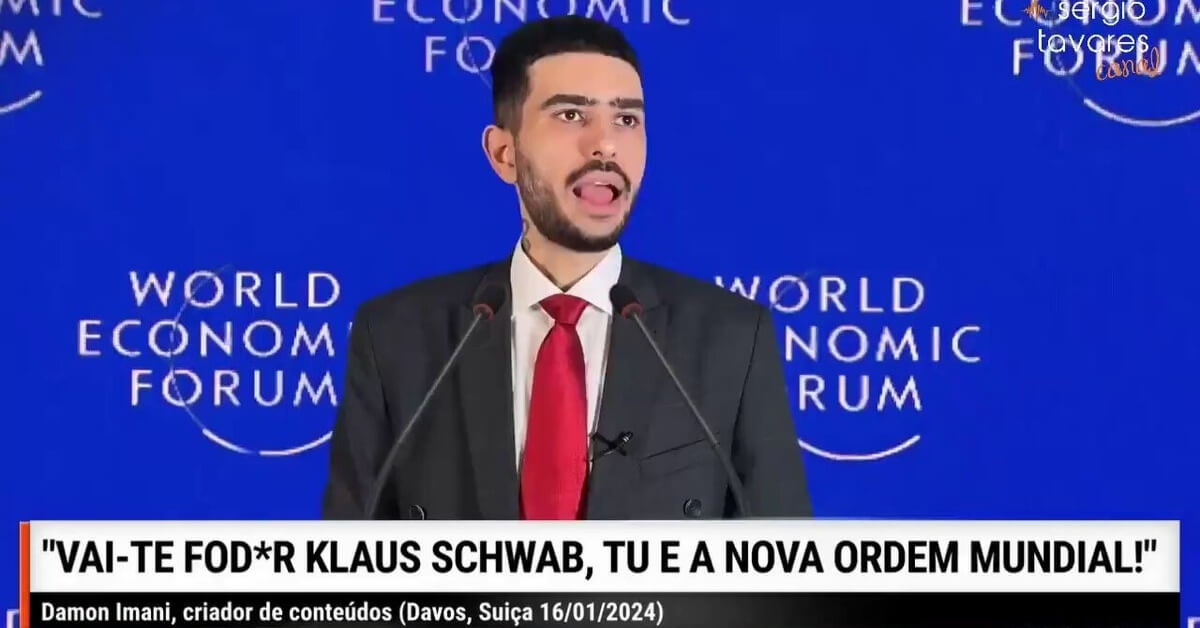The current lexicon is a fine line between reality and satire. The recent incident at the prestigious World Economic Forum (WEF) in Davos has stirred the pot of global discourse.
Imagine, if you will, a stage where the world’s elite gather to discuss the future, only to be interrupted by an unexpected, expletive-laden tirade. Sounds like something out of a mindnumbingly crass reality TV show, doesn’t it?
But did it really happen? Could the normally staid and scripted world of global economic forums have been the setting for a moment of unscripted, rebellious candor?
The answer, dear readers, is as layered as a well-made lasagna but significantly less comforting.
No, Damon Imani did not actually shout profanities at WEF Chairman Klaus Schwab during the 2024 Davos meeting. This sensational scene was the result of a satirical video created by Imani himself, a content creator known for his humorous and thought-provoking takes on current events.
Decoding the Truth Behind the Viral Sensation: The Damon Imani Shenanigans
The video in question, a 19-second clip showcasing Imani’s supposed outburst, spread like wildfire across social media platforms. The authenticity of the video was immediately questioned, given its rather dramatic content.
The man himself, Damon Imani, a Denmark-based content creator, is no stranger to the world of satire. His body of work is a testament to his ability to weave humor into the fabric of current affairs, often leaving his audience both entertained and enlightened.
But what makes this particular instance stand out? For starters, the video was cleverly edited to feature Imani seemingly on stage at the WEF event, hurling insults at Schwab and his “new world order.”
The audacity and boldness of the statement, “We the people were born free, we will stay free, and you and all of your globalist friends including everyone in this room can go [expletive] yourselves,” would be enough to raise anyone’s eyebrows.
The truth, however, lies in the details. A closer examination reveals that the visuals of Schwab and Swiss President Viola Amherd exiting the stage are actually from the official WEF livestream.
The inconsistency in lighting on Imani’s face compared to the rest of the footage is a tell-tale sign of editing. Furthermore, Imani’s own words on social media, “Satire but true,” confirm the satirical nature of the video.
Adding to the intrigue, Imani expressed frustration over the treatment of his post on social media platform X, alleging that the imposition of a Community Note was an attempt to demonetize his content. This controversy highlights the ongoing debate over free speech and content moderation on social media platforms.
Reflecting on the Power of Satire
In an era where misinformation can spread rapidly, the impact of satirical content like Imani’s cannot be underestimated. It prompts us to question the nature of truth in our hyper-connected world. How often do we pause to verify the authenticity of what we see online? Does satire have the power to influence public opinion just as strongly as factual reporting?
As we ponder these questions, we must also consider the responsibility of content creators in shaping public discourse. Does blending humor and reality serve a greater purpose, or does it risk muddying the waters of truth?
How do we navigate the fine line between satire and misinformation in an age where every individual with a smartphone can be a content creator?
Share your take and opinions in the comments section below.

